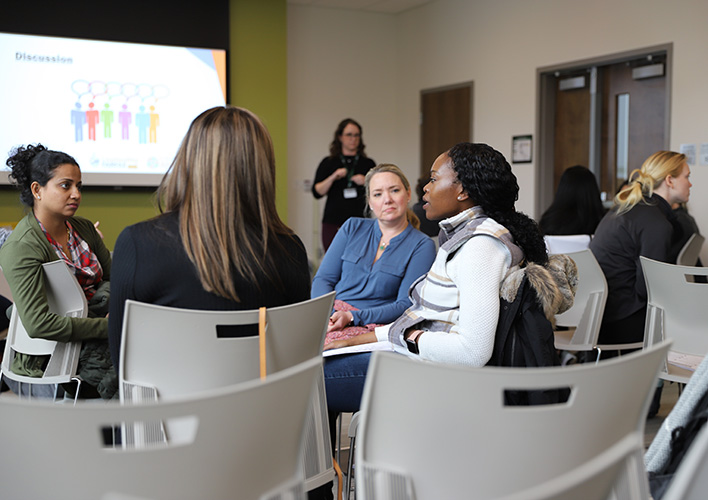
As part of the mission to become a leading source of workforce development in the region, the Northern Virginia Area Health Education Center (NVAHEC) offered the first module in its Cultural Competency Training Series November 8.
The Washington, DC metropolitan area is one of the fastest growing and most diverse regions in the United States, and increasing evidence points to significant and preventable health care disparities within the region and the country.
As part of the mission to become a leading source of workforce development in the region, the Northern Virginia Area Health Education Center (NVAHEC) offered the first module in its Cultural Competency Training Series November 8. NVAHEC is based in George Mason University’s College of Health and Human Services in the newly opened Population Health Center. NVAHEC works to increase diversity among health professions and support interdisciplinary training for practicing professionals and students in health career academic programs.
Culture can include a range of factors such as ethnicity, language, religion, gender identity, sexual orientation, age or peer group, geography, and other sociological characteristics. Cultural competence involves being conscious of one’s own biases and how that may affect how you interact with or provide care to others and understanding where differences may arise in the health care system related to culture so that those can be addressed during the provision of care for better patient experiences and health outcomes.
“The training is called ‘Tell Me Your Story,’ because each patient has a different story,” explained NVAHEC Director Karen Brown. “You have your own culture as a provider as well, and culture can affect how patients respond and access the care they need.”
Brown kicked off the first module—Navigating the Healthcare System—by working with the participants to set ground rules for the experience. The participants were broken into small groups and asked to share personal examples of cultural experiences. They went on to view videos and discuss how care providers can improve the patient experience when cultural competency is incorporated into their care. Some of the solutions the participants discussed included asking patients about their full histories (not just their medical histories or looking at one point on a chart), which can give providers additional clues about their illnesses and their familiarity (or unfamiliarity) with the U.S. health care system.
The participants discussed the importance of considering the whole patient experience—from beginning to end—starting from the time they set up the appointment. Underserved patients often report being mistreated throughout the health care experience, and this prevents them from seeking care in the future. Additionally, the U.S. health care system is more complex and more expensive than in other countries, which can be a particular challenge for new immigrants.
One solution offered was to prepare registration personnel with a script or form to help identify those patients who may need additional explanation of how the process works or how many bills they can expect to receive.
“It’s about each person being treated as an individual and with dignity and respect, and how far that goes on top of everything else,” explained Rachel Lynch, director of the Community Health Improvement at Inova Health System, who helped develop the training.
Dr. Caroline Sutter, director of professional and workforce development at the Population Health Center and co-director of the Mason and Partners (MAP) Clinics, explained, “It’s important that we make sure that patients understand their diagnosis, and the next steps for treatment to help them to actively navigate to health. We tend to be focused on treating the disease but need to remember that is not always the direct provision of care that makes the biggest difference but rather taking the time to listen to any barriers that may prevent them from being successful in becoming healthy. Maybe it takes more time to listen, but maybe that’s the most important part.”
She emphasizes, “It’s important for us to have accountability at every touch point in the health care system if patients are to successfully navigate this complicated health care system.” She recommended, as is routine at the MAP Clinics, when sending patients to the hospital or other care providers, to provide them with written details to share with that next place of care. They encourage their patients to be advocates for themselves and give their patients tools to do so.
The participants in this first training module included nursing faculty and students at all levels and representatives from Inova and Fairfax County Health Department. The training is geared toward an interprofessional audience, and NVAHEC hopes to offer the module to other professionals working in the medical field, such as social workers, receptionists, technicians, financial services, and anyone who might have contact with a patient.
Lynch helped develop the modules because as she explains, “Everyone has biases—implicit or otherwise—and we need to better understand what these are in ourselves and in our health care system. Recognizing that and understanding how it affects patient care, raising the awareness of how it impacts outcomes, and just again the importance of the whole patient and patient-centered care, that’s what the heart of this really is.”
The curriculum for the Cultural Competency Training Series is grounded in the Culturally and Linguistically Appropriate Services (CLAS) standards, developed by the U.S. Department of Health and Human Services Office of Minority Health. It aims to prepare an interprofessional workforce for working in a culturally diverse health care environment—often working with individuals from backgrounds quite different from their own. Brown delivered the training, which NVAHEC developed with Inova, Partnership for a Healthier Fairfax, Fairfax County Health Department, and George Mason University.
Additional Tell Me Your Story modules include Social Determinants of Health and Behavioral Health. For more information about the trainings, contact Karen Brown at kbrown62@gmu.edu.
